The Role of Interviews in Documentary Film Narratives

Understanding the Importance of Interviews in Documentaries
Interviews play a pivotal role in documentary filmmaking, providing firsthand insights that enrich the narrative. They serve as a bridge between the audience and the subject, allowing viewers to connect emotionally with the stories being told. By featuring diverse voices, filmmakers can present a multifaceted view of reality, making the documentary more relatable and impactful.
Documentaries are a way of seeing and understanding the world through the eyes of others, giving voice to the voiceless.
Moreover, interviews can introduce critical context and background information that might otherwise be overlooked. They offer a platform for subjects to share their experiences, perspectives, and emotions, helping to humanize complex issues. This depth of understanding transforms a simple observation into a powerful story that resonates with the audience.
In essence, interviews are not just supplementary; they are integral to the storytelling process. They provide authenticity and credibility, giving the audience a chance to hear directly from those involved in the narrative. This direct engagement can significantly enhance the overall experience of the documentary.
Crafting Compelling Interview Questions
The art of conducting interviews lies in crafting compelling questions that elicit meaningful responses. Open-ended questions encourage subjects to share their thoughts and feelings more freely, creating a richer narrative. For example, instead of asking 'Did you enjoy that experience?', a more engaging question might be 'What emotions did that experience evoke for you?'

Additionally, the order in which questions are asked can influence the flow of the conversation. Starting with lighter, more general questions can help build rapport and make the interviewee feel comfortable. As trust develops, the interviewer can gradually delve into deeper, more sensitive topics, leading to more profound insights.
Interviews Enhance Documentary Stories
Interviews provide vital insights and emotional connections that enrich the narrative of documentaries.
Ultimately, the goal is to create a dialogue that feels natural and genuine. Thoughtfully designed questions not only allow for comprehensive answers but also reveal the interviewee's personality and motivations. This connection is what helps to engage viewers and keep them invested in the story being told.
The Role of Visuals During Interviews
While the spoken word is crucial, visuals during interviews can enhance understanding and emotional impact. The setting, for instance, can provide context about the interviewee's background or the subject matter. A person discussing their childhood in a familiar neighborhood can evoke nostalgia and relatability, making the narrative more poignant.
The best documentaries are those that invite viewers to question their own perspectives and explore the complexities of human experience.
Moreover, body language and facial expressions convey emotions that words often cannot capture. A subtle smile or a moment of hesitation can provide insight into the interviewee's feelings, adding layers to the narrative. These non-verbal cues can invite viewers to empathize with the subject on a deeper level.
Incorporating b-roll footage during interviews—such as relevant events or personal artifacts—can further enrich the storytelling. This visual storytelling technique allows filmmakers to weave together narrative threads, creating a more dynamic and engaging viewing experience. By complementing interviews with visuals, filmmakers can create a compelling tapestry of life’s stories.
Ethical Considerations in Conducting Interviews
Conducting interviews for documentaries comes with ethical responsibilities that filmmakers must navigate carefully. Informed consent is paramount; subjects should understand how their stories will be used and have the right to withdraw at any time. This transparency fosters trust and respects the dignity of those sharing their experiences.
Furthermore, filmmakers should be sensitive to the emotional weight of the topics being discussed. Some subjects may recount traumatic experiences, and it's essential to approach these conversations with care and empathy. Establishing a safe space for interviewees can lead to more authentic and impactful storytelling.
Crafting Questions for Deeper Insight
Thoughtful, open-ended questions foster genuine dialogue and reveal the interviewee's personality and experiences.
Ethical considerations also extend to how interviews are edited and presented in the final product. Filmmakers must be cautious not to misrepresent or manipulate the narrative through selective editing. By prioritizing integrity and respect, filmmakers can create documentaries that honor the voices and stories they portray.
The Impact of Interviews on Audience Connection
Interviews have a unique ability to forge a connection between the audience and the subjects of a documentary. When viewers hear personal stories and experiences, they are often moved to empathize with the interviewees. This emotional connection can lead to a deeper understanding of complex social issues, making the documentary more than just an informative piece.
Moreover, interviews can challenge preconceived notions and foster dialogue among viewers. By presenting diverse perspectives, filmmakers encourage audiences to consider viewpoints they may not have encountered before. This broadening of horizons can inspire discussions, provoke thought, and even spark social change.
Ultimately, interviews serve as a reminder of our shared humanity. They highlight individual experiences within the broader context of society, allowing viewers to relate to stories that might otherwise feel distant. This sense of connection is what makes documentaries resonate long after the credits roll.
Creating a Narrative Arc with Interview Content
A well-structured documentary often follows a narrative arc, and interviews play a crucial role in shaping this progression. By strategically placing interviews at key points in the narrative, filmmakers can create tension, build suspense, or provide resolution. This careful orchestration keeps viewers engaged and invested in the unfolding story.
For example, introducing an interview that reveals a turning point in a subject's life can serve as a powerful climax. Conversely, concluding with a reflective interview can provide closure and insight, leaving viewers with lasting impressions. The placement and timing of interviews can significantly affect the emotional trajectory of the documentary.
Ethics Are Key in Documentary Interviews
Filmmakers must prioritize ethical considerations, ensuring informed consent and respectful representation of interview subjects.
Additionally, varying the types of interviews—such as expert opinions, personal testimonials, or contrasting viewpoints—can create a more dynamic narrative. This variety not only enriches the storytelling but also helps to maintain audience interest throughout the film. By weaving together these elements, filmmakers can create a compelling and cohesive narrative that captivates viewers.
The Future of Interviews in Documentary Filmmaking
As documentary filmmaking continues to evolve, so too does the role of interviews. With advancements in technology, filmmakers can now explore innovative ways to conduct and present interviews. Virtual reality, for instance, offers immersive experiences that allow viewers to engage with subjects in a whole new way, creating a more intimate connection.
Social media platforms have also transformed how filmmakers source interview subjects. Documentarians can now reach a wider audience and discover unique stories that resonate with diverse communities. This democratization of storytelling can lead to richer, more varied narratives that reflect the complexities of contemporary society.

Looking ahead, the challenge will be to balance innovation with authenticity. While new formats and technologies can enhance the storytelling experience, maintaining the core values of respect, empathy, and integrity will always be essential. As filmmakers navigate this landscape, the humble interview will likely remain a cornerstone of documentary narratives, continuing to illuminate the human experience.